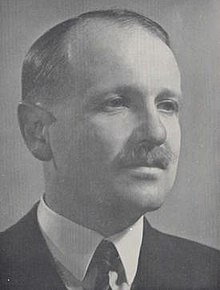Oliver Philpot
| Oliver L. S. Philpot | |
|---|---|
 |
|
| Born |
6 March 1913 Vancouver, British Columbia, Canada |
| Died | 29 April 1993 (aged 80) London |
| Allegiance |
|
| Service/branch | Royal Air Force |
| Years of service | 1939–1946 |
| Rank | Flight Lieutenant |
| Service number | 77131 |
| Unit | 42 Squadron |
| Awards |
Military Cross Distinguished Flying Cross |
| Other work | Food industry executive |
Oliver Lawrence Spurling Philpot, MC, DFC (6 March 1913 – 29 April 1993) was a Canadian born World War II RAF pilot and subsequently a businessman, best known for being one of the three men to successfully escape from Stalag Luft III in the escape known as The Wooden Horse.
After the war, Philpot resumed his career in management in the food industry. He wrote the book Stolen Journey, in which he recounts daily life as a prisoner in various POW camps, ending with his escape via the Wooden Horse and his return to England.
Philpot was born in Vancouver, British Columbia, the son of an expatriate London engineer. Holding both British and Canadian citizenships he returned to England as a child. He was educated first, at Aymestrey School near Worcester, then at Radley College between 1927 and 1932 and then studied Philosophy, Politics and Economics at Worcester College, Oxford University. During his time at Oxford he joined the Oxford University Air Squadron and learned to fly.
Upon graduating in 1934, he joined Unilever as a management trainee and in 1936 was appointed assistant commercial secretary in Unilever's home margarine executive. This proved to be useful in his wartime escape as the post required him to travel extensively in Germany and to learn to speak German.
Service in the University Air Squadron automatically made Philpot a member of the Royal Air Force Volunteer Reserve (RAFVR) on its formation in 1936. With the approach of the war Philpot was recalled for service in August 1939 and he was posted as a Pilot Officer on probation to 42 Squadron, an 18 Group Coastal Command unit then operating Vickers Vildebeest torpedo bombers. The squadron re-equipped with the Bristol Beaufort in 1940 and took part in the Norwegian Campaign.
...
Wikipedia
